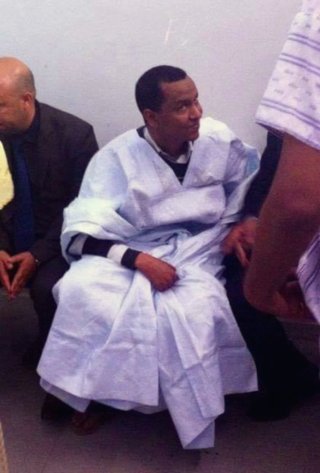Related Research Articles

Asma Jilani Jahangir was a Pakistani Muhajir human rights lawyer and social activist who co-founded and chaired the Human Rights Commission of Pakistan and AGHS Legal Aid Cell. Jahangir was known for playing a prominent role in the Lawyers' Movement and served as the United Nations Special Rapporteur on Freedom of Religion or Belief and as a trustee at the International Crisis Group.

Farag Foda was a prominent Egyptian professor, writer, columnist, and human rights activist.
Mohammed Younus Shaikh is a Pakistani medical doctor, human rights activist and freethinker.

Delwar Hossain Sayeedi was a Bangladeshi Islamic leader, politician, public speaker, and convicted war criminal, who served as a Member of Parliament representing the Pirojpur-1 constituency from 1996 to 2006.

The situation of human rights in Pakistan is complex as a result of the country's diversity, large population, its status as a developing country and a sovereign Islamic democracy with a mixture of both Islamic and secular law.

The Pakistan Penal Code outlaws blasphemy against any recognized religion, with punishments ranging from a fine to the death penalty. According to various human rights organizations, Pakistan's blasphemy laws have been used to persecute religious minorities and settle personal rivalries, frequently against other Muslims, rather than to safeguard religious sensibilities.

In Islam, blasphemy is impious utterance or action concerning God, but is broader than in normal English usage, including not only the mocking or vilifying of attributes of Islam but denying any of the fundamental beliefs of the religion. Examples include denying that the Quran was divinely revealed, the Prophethood of one of the Islamic prophets, insulting an angel, or maintaining God had a son.

Saudi Arabia's laws are an amalgam of rules from Sharia, royal decrees, royal ordinances, other royal codes and bylaws, fatwas from the Council of Senior Scholars and custom and practice.
The main blasphemy law in Egypt is Article 98(f) of the Egyptian Penal Code. It penalizes: "whoever exploits and uses the religion in advocating and propagating by talk or in writing, or by any other method, extremist thoughts with the aim of instigating sedition and division or disdaining and contempting any of the heavenly religions or the sects belonging thereto, or prejudicing national unity or social peace."

Muhammad Zia-ul-Haq's dictatorship after assuming the position of sixth president of Pakistan began on 16 September 1978 and ended with his death in an aircraft crash on 17 August 1988. Zia came to power after a coup, overthrowing prime minister Zulfikar Ali Bhutto and imposing martial law in 1977.

In 2010, a Pakistani Christian woman, Aasiya Noreen, commonly known as Asia Bibi or Aasia Bibi, was convicted of blasphemy by a Pakistani court and was sentenced to death by hanging. In October 2018, the Supreme Court of Pakistan acquitted her based on insufficient evidence, though she was not allowed to leave Pakistan until the verdict was reviewed. She was held under armed guard and was not able to leave the country until 7 May 2019; she arrived in Canada the next day.

Azimzhan Askarov was a Kyrgyzstani political activist who founded the group Vozduh in 2002 to investigate police brutality. Of ethnic Uzbek descent, during the 2010 South Kyrgyzstan ethnic clashes, which primarily targeted people of the Uzbek nationality, Askarov worked to document the violence.
Rashid Rehman was a Pakistani lawyer and a regional coordinator for the Human Rights Commission of Pakistan (HRCP). He was well known for his work with clients who were poor or who were charged under Pakistan's vigorous blasphemy laws. After he became the defence lawyer for Junaid Hafeez in a controversial and widely publicized blasphemy case, he received death-threats, lastly in court in April 2014 by prosecution lawyers, but Rehman refused to abandon his client. As a result of this incident, complaints were laid with police and the District Bar Association but no action had been taken or protection provided when he was shot and killed by gunmen on 7 May 2014, and two colleagues injured.
Shafqat Emmanuel and Shagufta Kausar are a Pakistani Christian couple who in 2014 were convicted of blasphemy by a Pakistani court, receiving a sentence of death by hanging. In 2021, the convictions were overturned.

Mohamed Cheikh Ould Mkhaitir is a Mauritanian blogger who was a political prisoner from 2014 to 2019. He was sentenced to death after he wrote an article critical of Islam and the caste system in Mauritania, after which he became a designated prisoner of conscience by Amnesty International. He now lives in exile in France due to concerns for his safety.

Tehreek-e-Labbaik Pakistan is a far-right Islamist political party in Pakistan. The party was founded by Khadim Hussain Rizvi in August 2015. It was the fifth largest party in Pakistan at the time of the 2018 Pakistani general election, and secured over 2.2 million votes. TLP currently holds one seat(Mehmood Ahmad PP-55 Narowal-II) in the Punjab Assembly of Pakistan.

Khadim Hussain Rizvi was a Pakistani Islamic scholar and the founder and Ameer of Tehreek-e-Labbaik Pakistan, a religiopolitical organization founded in 2015, known to protest against any change to Pakistan's blasphemy law.

The situation for apostates from Islam varies markedly between Muslim-minority and Muslim-majority regions. In Muslim-minority countries, "any violence against those who abandon Islam is already illegal". But in some Muslim-majority countries, religious violence is "institutionalised", and "hundreds and thousands of closet apostates" live in fear of violence and are compelled to live lives of "extreme duplicity and mental stress."
Ahmad Waqass Goraya is a Pakistani-born activist and blogger based in the Netherlands. He is among several Pakistani bloggers and authors overseas who are critics of the Pakistan Army who have been persecuted, tortured and threatened. They include Salman Haider, Gul Bukhari, and others.
References
- 1 2 3 4 5 6 7 8 9 10 11 12 Cristo, Carmen (25 June 2014). "Jackson Rallies to Save Junaid Hafeez". Jackson Free Press. Retrieved 15 November 2014.
- 1 2 3 4 5 Shah Meer Baloch & Hannah Ellis-Petersen, Death sentence for Pakistani lecturer in blasphemy case prompts outcry, The Guardian (21 December 2019).
- 1 2 3 4 5 6 7 Sethi, Ali (20 May 2014). "Pakistan's Tyranny of Blasphemy". New York Times. Retrieved 15 November 2014.
- 1 2 3 4 S. Khan, Junaid Hafeez: Why is Pakistani scholar's blasphemy case receiving scant attention?, Deutsche Welle (10 July 2019).
- 1 2 3 4 5 Pakistan: End Ordeal for 'Blasphemy' Defendants, Human Rights Watch (6 October 2019).
- 1 2 3 4 5 6 7 Pakistan: Authorities must immediately and unconditionally release Junaid Hafeez, Amnesty International (25 September 2019).
- 1 2 3 Junaid Hafeez: Academic sentenced to death for blasphemy in Pakistan, BBC News (21 December 2019).
- ↑ "Pak lawyer defending blasphemy accused receives 'beheading threat' letter from IS". Deccan Chronicles. 5 December 2014. Retrieved 20 December 2014.
- ↑ Junaid Hafeez’s parents appeal to CJ for justice, Dawn (29 November 2019).
- ↑ Pakistan: Release Professor Junaid Hafeez, Scholars at Risk (6 November 2019).